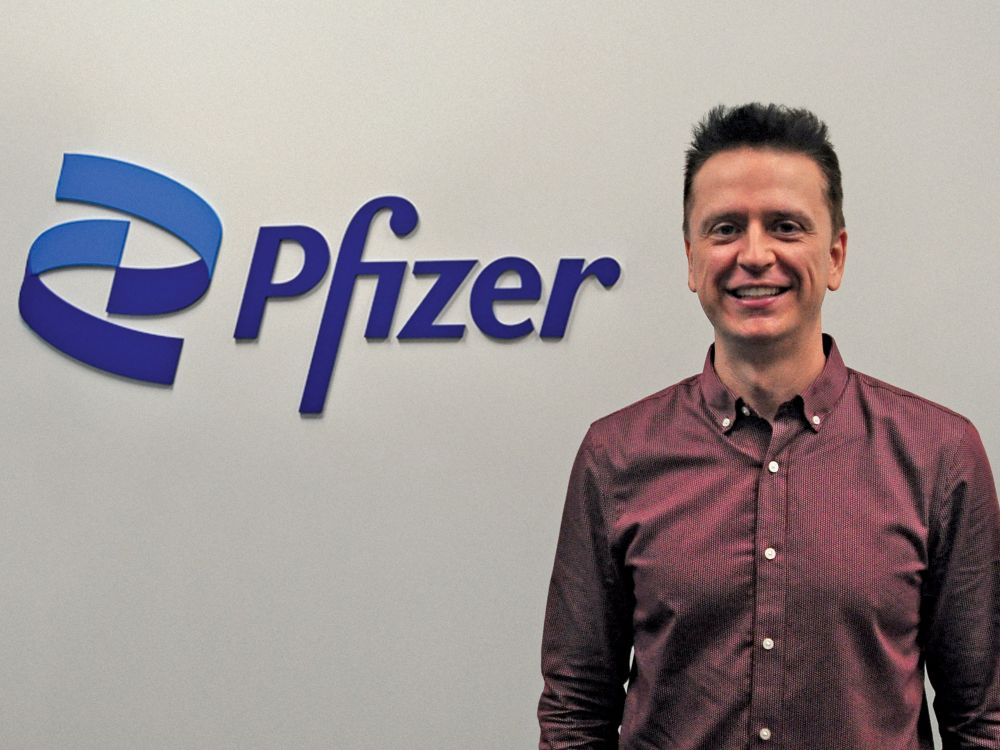What does it take to land a job at a high-profile pharmaceutical company like Pfizer?
For Daryl Fediuk [B.Sc.(Pharm.)/03, PhD/12], it all started 24 years ago with a summer job in a UM lab.
Fediuk, who had grown up in the Westwood neighbourhood of Winnipeg, was two years into his bachelor’s program in pharmacy – a field that appealed to him because he loved math and chemistry and wanted to help people.
“When I looked for a profession where I could have a direct impact on prolonging someone’s life, I knew pharmacy was the best fit for me,” he recalls.

Dr. Xiaochen Gu, who is still a professor at the College of Pharmacy today, welcomed Fediuk into his lab as a summer research student. There, Fediuk was captivated by two aspects of pharmacology: pharmacokinetics (how a patient’s body handles a drug) and pharmacodynamics (how a drug works in the body), often abbreviated PK-PD.
“I became fascinated by the research that happens behind the scenes, before medicines arrive at the pharmacy,” he says.
Fediuk went on to earn his PhD in pharmaceutical sciences at UM, with Gu as his advisor. He then completed a two-year PK-PD postdoctoral fellowship at the University of North Carolina, sponsored by the pharmaceutical company GlaxoSmithKline.
“From there, the opportunities were endless,” he says. He joined Pfizer’s Connecticut facility in 2014. Ten years later, he and his family moved to the Research Triangle area of North Carolina, where they currently live.
There are two main parts to Fediuk’s role at Pfizer as a clinical pharmacology lead, he says. “One is strategic – designing and planning clinical trials. Then there’s the mathematical side – analyzing data to understand how a drug behaves in the body and determining the best way to dose it.
“I answer questions like: Should patients take the drug once or twice per day? How is the compound absorbed, distributed, metabolized and excreted by the body? We study that in healthy participants, but we also assess how the compound behaves in special populations, such as those with liver or kidney impairments.”
The scientist is proud to have been part of the team that brought a prescription medicine for Type 2 diabetes to market seven years ago. “Our studies for this particular medicine were reviewed by regulatory agencies around the world,” he says.
Fediuk’s research has been published in journals such as the Journal of Clinical Pharmacology and Clinical Pharmacology in Drug Development.
Looking back on his career path, he says networking played an important role while he was still at UM.
“Through conversations at scientific conferences, I learned what it’s like to work in different settings – whether at a university, in the pharmaceutical industry or with government.”
Among all his experiences at UM, he says, receiving unwavering support from Gu stands out the most.
“He wasn’t just a supervisor and mentor – Dr. Gu treated me like family,” Fediuk says.
“He’s like a parent who has been there for me throughout my career, from the time I joined his UM lab to applying for my fellowship program and joining Pfizer. His feedback and recommendations helped open doors for me.”
BY DANICA HIDALGO CHEREWYK
